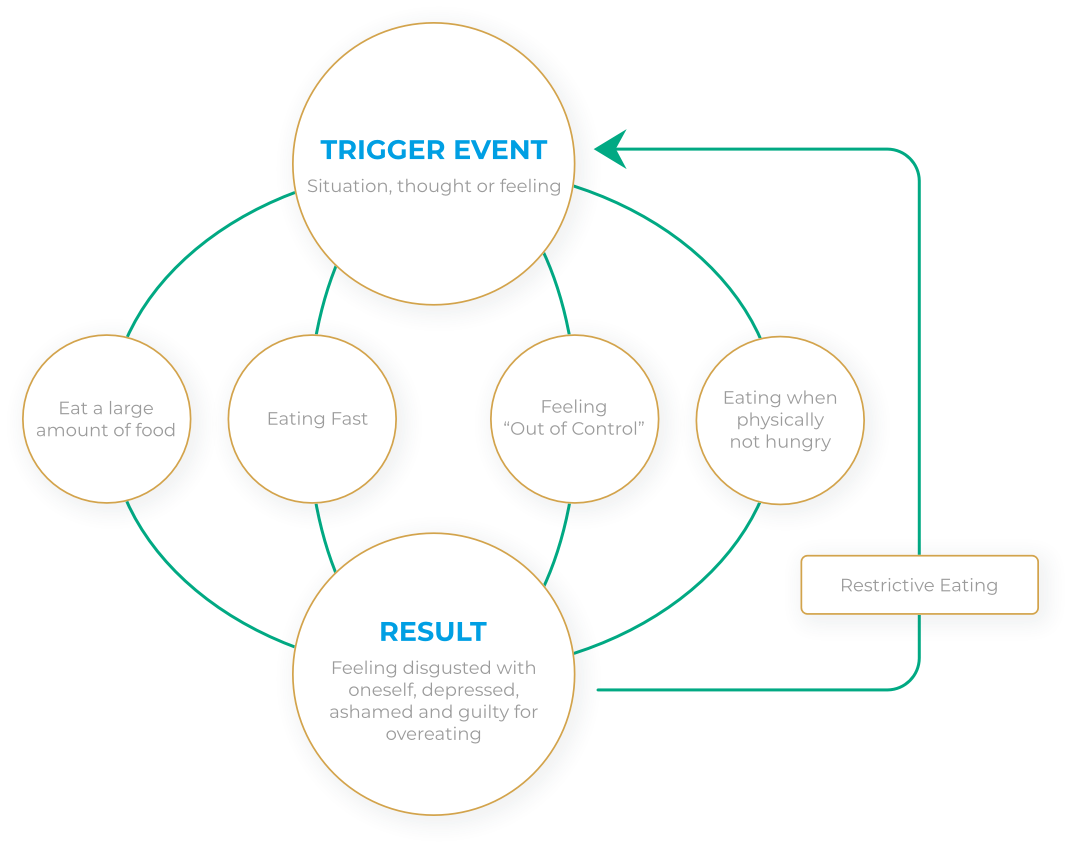Binge Eating Treatment
- Expertise You Can Trust: Over 19 Years of Evidence-Based, Professional Practice.
- Supportive Space: Compassionate Care in a Safe & Respectful Environment.
- Holistic Healing: Focus on Emotional, Physical & Mental Wellbeing for Lasting Change.
BINGE EATING DISORDER TREATMENT
Begin Your Path To Healing & Wellness Today
Are you feeling overwhelmed by your relationship with food, often bingeing in secret, feeling numb for a moment, before self-loathing and shame kicks in? Do stress and guilt often accompany your meals, leaving you feeling powerless and trapped in a cycle of overeating?
If you’re yearning for change and searching for a path to a healthier, happier life, our binge eating disorder treatment services are here to support you. It’s time to break free from the hold that food has over you, and to start investing in you.
With our professional binge eating disorder treatment services, you can expect to experience:

COMPASSION
Compassionate, judgement-free care tailored to your unique needs

STRATEGIES
Proven strategies to help manage and reduce binge episodes

SUPPORT
Supportive therapy to uncover and address the root causes of your disorder

EMPOWERMENT
Empowerment to develop a healthier relationship with food and yourself
If you’re ready to take that courageous first step, we’re here for you every step of the way. Let us help you find the freedom and peace you deserve.
Call us now on 020 7622 7727, or book a call with our friendly team below.
TAKE CONTROL OF YOUR HEALTH TODAY – WE ARE HERE TO HELP
Struggling with weight and eating challenges? You don’t have to face it alone.
Our compassionate team is ready to listen, support, and guide you toward a healthier, happier life.
Book your free call now and take the first step.
Sarah – Do You Resonate With Her Story?
TRAPPED IN A CYCLE OF BINGEING & RESTRICTING, SHAME & LOW SELF WORTH
Sarah is a 35-year-old woman who has been grappling with binge eating issues for most of her life. For as long as she can remember, Sarah has struggled with her relationship with food, often using it as a source of comfort during stressful times. Her eating habits have been a constant cycle of restricting and bingeing, leaving her feeling out of control and trapped in an unhealthy pattern of self-sabotage.
As a single woman, she often feels the societal pressure to look a certain way in order to meet someone special, which only exacerbates her binge eating tendencies. The guilt and shame that follow each binge episode have eroded her self-esteem, making it difficult for her to engage in social activities or date. She feels stuck in a loop where her eating disorder impacts her ability to find happiness and fulfilment in her personal life.
In addition to her personal struggles, Sarah is also stressed and unhappy in her career. She works in a high-pressure job that leaves her exhausted and anxious at the end of each day. This stress often triggers episodes of emotional eating, creating a vicious cycle that seems impossible to break.
Sarah is acutely aware that her binge eating is harming her physically, contributing to weight gain and health issues. She’s grown tired of feeling unwell and is terrified of the long-term effects on her health. Realising that her attempts to manage these challenges on her own have been ineffective, Sarah is now searching for a binge eating disorder treatment service.
She’s motivated by a desire to regain control over her life, improve her mental well-being, and develop healthier coping mechanisms to deal with the stressors in her life. With professional support, Sarah hopes to cultivate a positive relationship with food and open the door to new opportunities for personal growth and happiness.
Read about our binge eating disorder treatment ser#sectionFivevices
Trapped In a Cycle of Bingeing & Restricting
The cycle of binge eating typically begins with a triggering event or emotion. This could be anything from stress, anxiety, or loneliness to encountering specific environments or social situations. Often, a person feels an overwhelming urge to eat as a way to cope with these difficult emotions.
During a binge episode, they consume a large quantity of food in a short period, often eating much more quickly than usual and to the point of physical discomfort. Despite intentions to enjoy the food, the act is usually accompanied by a feeling of being out of control, as if they cannot stop or regulate their eating. This involuntary consumption can occur even when they are not physically hungry, acting as a temporary escape from emotional distress.
After the binge episode, individuals frequently experience a complex mix of emotions, including disgust, shame, guilt, and depression. The physical discomfort from overeating adds to their emotional turmoil. This emotional aftermath often leads to a resolve to fast, or restrict food intake in the hope of regaining control over their eating habits. However, this cycle of restriction only increases the likelihood of future binge episodes as the physical and psychological deprivation builds up.
This cyclical pattern perpetuates a relentless loop, trapping individuals in a constant battle with food and their emotions, further damaging self-esteem and reinforcing the negative feelings associated with binge eating.

MEET PAUL & HEAR HIS STORY
Paul shares how working with WeightMatters has transformed his life.
BINGE EATING DISORDER TREATMENT
Starting treatment for binge eating disorder is a brave step towards taking back control of your life. With personalised therapy and nutritional support, you’ll learn to break free from disordered eating patterns and develop a healthier relationship with food.
Every small step is a move towards healing. You’re not alone, and with the right support, lasting change is possible.

THERAPY
Therapy can be an effective tool in addressing the emotional and psychological factors underlying binge eating

NUTRITION
Proper nutrition plays a crucial role in developing healthier eating patterns and supporting recovery

PSYCHIATRY
Psychiatry can support with medication management and evaluating co-occurring mental health conditions
WeightMatters offers a comprehensive approach to treating binge eating by addressing the interconnected biological, psychological, and social factors contributing to the disorder.
By integrating these elements, we can support you in building long-term resilience and wellbeing. Let us help you reclaim your life. Take action today.
It’s Time To Heal.
Therapy
We have an experienced therapy team at WeightMatters who specialise in binge eating disorder treatment. Here are some interventions they may use:
- Challenge old, unhelpful eating habits and patterns, and support yourself in creating new behaviors around food.
- Develop emotional agility to name, feel, and manage emotions without using food to suppress them.
- Identify the thoughts, beliefs, and assumptions that keep you stuck in your binge eating cycle, and learn skills to challenge them.
- Build greater levels of self-esteem and self-worth as you begin to change the deep beliefs that shape your self-concept.
- Challenge negative body image and construct new, positive ways of thinking and feeling about your body.
- Learn how to manage stress in your life and find ways to be more assertive in relationships.
- Build a toolkit of strategies to keep yourself on track with your progress.
These practical interventions are often integrated with a deeper exploration of the themes that have initiated and maintained binge eating in someone’s life. This integrative therapeutic approach allows our therapists to tailor binge eating treatment to fit your individual recovery goals.
Nutrition
Here are some of the practical interventions our nutritionists use to support recovery and promote healthy eating in binge eating disorder:
- Personalised guidance to address your unique dietary needs and eating behavior challenges.
- Investigating your eating habits, medical history, and lifestyle to gain insight into your specific triggers and nutritional gaps.
- Creating a structured, balanced meal plan aimed at stabilising your eating patterns, reducing the risk of binge episodes, and promoting nutritional balance.
- Introducing regular meals and snacks spaced appropriately throughout the day, we help you avoid excessive hunger that often triggers binge eating.
- Education on recognizing hunger and satiety cues and help you practice mindful eating techniques.
- Identifying emotional and environmental triggers for your binge eating and collaborating on developing healthier coping strategies.
- Fostering a supportive and understanding therapeutic environment, our nutritionists empower you to build a more positive relationship with food.
- Regular follow-up sessions allow us to track progress, make needed adjustments to your meal plan, and support you on your journey toward recovery.
By combining psychological and nutritional interventions, our therapists can create a holistic and supportive treatment plan that addresses the various factors that drive and maintain binge eating disorder.
Psychiatry
Here are some ways our psychiatry team can support with binge eating disorder treatment:
Diagnosis & Assessment – Conduct a thorough evaluation to diagnose binge eating disorder, assessing both the psychological and physical aspects of the condition, as well as any comorbid mental health issues such as depression or anxiety.
Medication Management – If appropriate, prescribe medications, such as antidepressants or appetite suppressants, that may help reduce binge eating episodes and address underlying mood disorders. They can also monitor the effectiveness and adjust the treatment plan as necessary.
Therapeutic Consultation & Referral – Provide psychotherapy, or refer patients to our specialised therapists and nutritionists to develop a comprehensive treatment plan.
BINGE EATING DISORDER TREATMENT – GETTING STARTED
We believe it is important for clients to begin their journey by focusing on the area most impacting them. Some might initially start with therapy to address psychological and emotional factors, while others might opt to see a nutritionist first to establish a healthier eating structure.
As you progress forward through your binge eating disorder treatment, additional services can be seamlessly integrated into your plan. Our Healing Disordered Eating: Rebalance programme allows you to blend both our psychology and nutrition services, and our Weight Loss Medication packages provide support with both our medical and nutrition teams.
We understand that effective binge eating disorder treatment needs to be both personalised and comprehensive. Let us take the time to understand your struggle, and develop a programme that transforms your life.
It is time to feel hopeful, heal, and start your journey to recovery.
Call us now, or book a free assessment call with our friendly client services team, who will answer any questions you have.
IT’S TIME TO START YOUR HEALING JOURNEY
You can discover our clear pricing structure.
SERVICES WE RECOMMEND FOR BINGE EATING DISORDER TREATMENT
Here are the WeightMatters services we recommend for binge eating disorder treatment.
IF IT FEELS MORE COMFORTABLE, EMAIL US
Do you have a question about our treatment and support?
Leave your details below, and we will come back to you with a personalised response.
